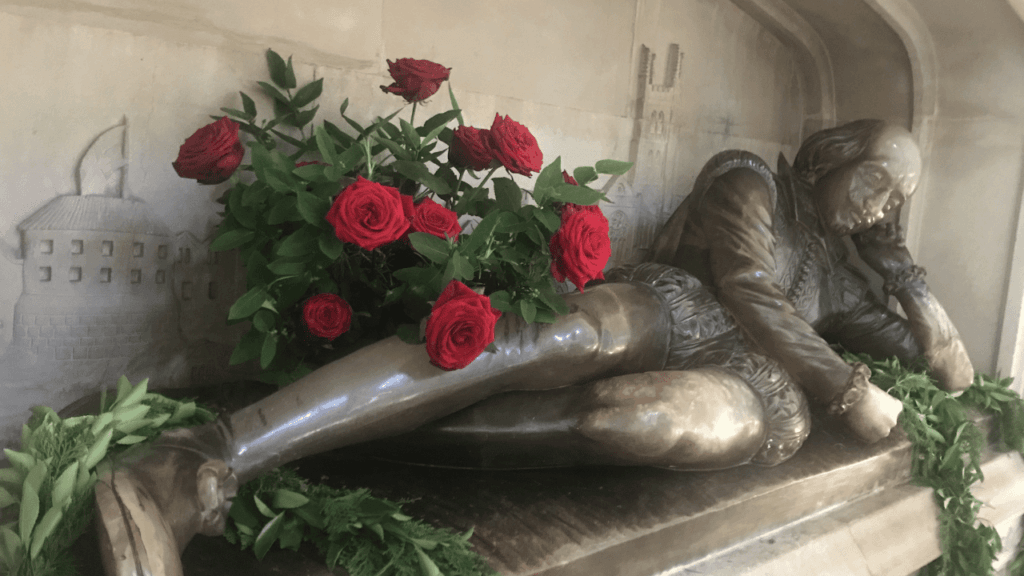William Shakespeare Quotes is widely seen as the greatest writer in the English language. He wrote 38 plays, 154 sonnets, and two long poems. These works have stayed important for over four centuries.
His plays have been translated into every language on Earth. They have shaped many stage plays, movies, songs, and poems. Shakespeare was a master at showing different human feelings in his plays.
He wrote about histories, comedies, tragedies, and tragi-comedies. His creativity was endless. Shakespeare created many words and phrases that we use today.
Key Takeaways
- William Shakespeare Quotes is considered the most celebrated writer in the English language.
- He wrote 38 plays, 154 sonnets, and two long narrative poems that have endured for centuries.
- Shakespeare’s works have been translated into every language and continue to influence various forms of media.
- His plays masterfully depict a diverse range of human emotions and experiences.
- Shakespeare is credited with inventing numerous words and phrases now commonly used in English.
The Enduring Legacy of Shakespeare’s Words
It’s been over four centuries since William Shakespeare passed away, but his words still move and inspire people all over the world. Shakespeare’s quotes are now a big part of our culture. They blend smoothly into literature, theater, and our daily conversations.
The Profound Impact of Shakespeare’s Quotes
These shakespeare quotes have gone beyond time and place. They capture readers with their deep wisdom, humor, and beauty. Shakespeare’s words speak to us today, showing us the human heart.
- Shakespeare’s influence on English is huge, with many of his famous phrases still used today.
- There are 27 moons of Uranus named after characters from Shakespeare, showing his big impact in space.
- Over 50 other authors have been suggested to have written Shakespeare’s works, causing a big debate.
The Literary and Cultural Significance of Shakespeare’s Works
Shakespeare life quotes and shakespeare sonnets are everywhere in popular culture. From shakespeare love quotes to shakespeare plays, his work touches many arts like painting, opera, ballet, music, and literature.
- “All the world’s a stage, and all the men and women merely players.” (As You Like It)
- “Life’s but a walking shadow, a poor player that struts and frets his hour upon the stage and then is heard no more.” (Macbeth)
- “To be, or not to be, that is the question.” (Hamlet)
- “Some are born great, some achieve greatness, and some have greatness thrust upon them.” (Twelfth Night)
- “There is a tide in the affairs of men, which, taken at the flood, leads on to fortune.” (Julius Caesar)
- “It is not in the stars to hold our destiny but in ourselves.” (Julius Caesar)
- “The web of our life is of a mingled yarn, good and ill together.” (All’s Well That Ends Well)
- “What’s past is prologue.” (The Tempest)
- “Better three hours too soon than a minute too late.” (The Merry Wives of Windsor)
- “We know what we are, but know not what we may be.” (Hamlet)
- “The course of true love never did run smooth.” (A Midsummer Night’s Dream)
- “Love looks not with the eyes, but with the mind.” (A Midsummer Night’s Dream)
- “Speak low, if you speak love.” (Much Ado About Nothing)
- “Love all, trust a few, do wrong to none.” (All’s Well That Ends Well)
- “Doubt thou the stars are fire, doubt that the sun doth move, doubt truth to be a liar, but never doubt I love.” (Hamlet)
- “Shall I compare thee to a summer’s day? Thou art more lovely and more temperate.” (Sonnet 18)
- “The very instant that I saw you, did my heart fly to your service.” (The Tempest)
- “I do love nothing in the world so well as you—is not that strange?” (Much Ado About Nothing)
- “When I saw you, I fell in love, and you smiled because you knew.” (As You Like It)
- “My bounty is as boundless as the sea, my love as deep.” (Romeo and Juliet)
- “A fool thinks himself to be wise, but a wise man knows himself to be a fool.” (As You Like It)
- “The better part of valour is discretion.” (Henry IV, Part 1)
- “Nothing will come of nothing.” (King Lear)
- “All that glisters is not gold.” (The Merchant of Venice)
- “The fault, dear Brutus, is not in our stars, but in ourselves.” (Julius Caesar)
- “Give every man thy ear, but few thy voice.” (Hamlet)
- “This above all: to thine own self be true.” (Hamlet)
- “Cowards die many times before their deaths; the valiant never taste of death but once.” (Julius Caesar)
- “Though she be but little, she is fierce.” (A Midsummer Night’s Dream)
- “Our doubts are traitors, and make us lose the good we oft might win, by fearing to attempt.” (Measure for Measure)
- “Uneasy lies the head that wears a crown.” (Henry IV, Part 2)
- “Hell is empty, and all the devils are here.” (The Tempest)
- “When sorrows come, they come not single spies, but in battalions.” (Hamlet)
- “I am constant as the northern star.” (Julius Caesar)
- “My crown is called content: A crown it is that seldom kings enjoy.” (Henry VI, Part 3)
- “The evil that men do lives after them; the good is oft interred with their bones.” (Julius Caesar)
- “Power is my mistress. I have worked too hard at her conquest to allow anyone to take her away from me.” (Henry IV, Part 1)
- “Reputation, reputation, reputation! O, I have lost my reputation!” (Othello)
- “Present fears are less than horrible imaginings.” (Macbeth)
- “Beware the Ides of March.” (Julius Caesar)
- “Words are easy, like the wind; faithful friends are hard to find.” (Sonnet 116)
- “Love me or hate me, both are in my favor. If you love me, I’ll always be in your heart. If you hate me, I’ll always be in your mind.” (Othello)
- “How poor are they that have not patience! What wound did ever heal but by degrees?” (Othello)
- “Men at some time are masters of their fates.” (Julius Caesar)
- “Misery acquaints a man with strange bedfellows.” (The Tempest)
- “One touch of nature makes the whole world kin.” (Troilus and Cressida)
- “Expectation is the root of all heartache.” (Henry IV, Part 1)
- “No legacy is so rich as honesty.” (All’s Well That Ends Well)
- “Brevity is the soul of wit.” (Hamlet)
- “Parting is such sweet sorrow, that I shall say good night till it be morrow.” (Romeo and Juliet)
“All the world’s a stage, and all the men and women merely players.”
Shakespeare’s sayings have become common phrases in our lives. They show his lasting effect on literary quotes and poetic quotes. They help us understand elizabethan literature and the works of classic english writers.
Exploring the Themes of Shakespeare’s Iconic 50 Quotes
William Shakespeare’s words have lasted through time, leaving a mark on literature and culture. From Hamlet’s tragic soliloquies to A Midsummer Night’s Dream’s whimsy, his shakespeare quotes about life are timeless. They touch the human heart deeply.
Love, Loss, and the Human Condition in Shakespeare’s Poetic Lines
Shakespeare’s best shakespeare quotes offer comfort in Romeo and Juliet’s sorrow or humor in Much Ado About Nothing. His shakespeare quotes on love show the power of passion. His shakespeare quotes about death face the fact of our end.
His shakespeare inspirational quotes stir the spirit, while his shakespeare sonnets quotes explore the heart’s depths. The Bard’s words have shakespearean wisdom that has moved and taught readers for centuries.
- “The course of true love never did run smooth.” (A Midsummer Night’s Dream)
- “Love is not love which alters when it alteration finds.” (Sonnet 116)
- “Love all, trust a few, do wrong to none.” (All’s Well That Ends Well)
- “Who ever loved that loved not at first sight?” (As You Like It)
- “With love’s light wings did I o’erperch these walls; for stony limits cannot hold love out.” (Romeo and Juliet)
- “She loved me for the dangers I had passed, and I loved her that she did pity them.” (Othello)
- “If music be the food of love, play on.” (Twelfth Night)
- “So long as men can breathe or eyes can see, so long lives this, and this gives life to thee.” (Sonnet 18)
- “I will not be sworn but love may transform me to an oyster.” (Much Ado About Nothing)
- “The more I give to thee, the more I have, for both are infinite.” (Romeo and Juliet)
- “It is not in the stars to hold our destiny but in ourselves.” (Julius Caesar)
- “There’s a divinity that shapes our ends, rough-hew them how we will.” (Hamlet)
- “The wheel is come full circle: I am here.” (King Lear)
- “What fate imposes, men must needs abide.” (Henry VI, Part 3)
- “Fortune brings in some boats that are not steered.” (Cymbeline)
- “Uneasy lies the head that wears a crown.” (Henry IV, Part 2)
- “Let me have men about me that are fat; sleek-headed men and such as sleep o’ nights: yond Cassius has a lean and hungry look.” (Julius Caesar)
- “Vaulting ambition, which o’erleaps itself and falls on the other.” (Macbeth)
- “A fool thinks himself to be wise, but a wise man knows himself to be a fool.” (As You Like It)
- “The very substance of the ambitious is merely the shadow of a dream.” (Hamlet)
- “All the world’s a stage, and all the men and women merely players.” (As You Like It)
- “Brevity is the soul of wit.” (Hamlet)
- “One touch of nature makes the whole world kin.” (Troilus and Cressida)
- “Nothing will come of nothing.” (King Lear)
- “Some rise by sin, and some by virtue fall.” (Measure for Measure)
- “How far that little candle throws his beams! So shines a good deed in a naughty world.” (The Merchant of Venice)
- “Reputation is an idle and most false imposition; oft got without merit, and lost without deserving.” (Othello)
- “To weep is to make less the depth of grief.” (Henry VI, Part 3)
- “No legacy is so rich as honesty.” (All’s Well That Ends Well)
- “When sorrows come, they come not single spies, but in battalions.” (Hamlet)
- “Cowards die many times before their deaths; the valiant never taste of death but once.” (Julius Caesar)
- “To die, to sleep—To sleep—perchance to dream.” (Hamlet)
- “Golden lads and girls all must, as chimney-sweepers, come to dust.” (Cymbeline)
- “Thou art more lovely and more temperate.” (Sonnet 18)
- “The rest is silence.” (Hamlet)
- “Fair is foul, and foul is fair.” (Macbeth)
- “The better part of valor is discretion.” (Henry IV, Part 1)
- “The time is out of joint; O cursed spite, that ever I was born to set it right!” (Hamlet)
- “O, what men dare do! What men may do! What men daily do, not knowing what they do!” (Much Ado About Nothing)
- “Et tu, Brute?” (Julius Caesar)
- “The fool doth think he is wise, but the wise man knows himself to be a fool.” (As You Like It)
- “Conscience doth make cowards of us all.” (Hamlet)
- “Expectation is the root of all heartache.” (Henry IV, Part 1)
- “The web of our life is of a mingled yarn, good and ill together.” (All’s Well That Ends Well)
- “Our doubts are traitors, and make us lose the good we oft might win by fearing to attempt.” (Measure for Measure)
- “Better a witty fool than a foolish wit.” (Twelfth Night)
- “I do desire we may be better strangers.” (As You Like It)
- “There’s small choice in rotten apples.” (The Taming of the Shrew)
- “Lord, what fools these mortals be!” (A Midsummer Night’s Dream)
- “Many a true word hath been spoken in jest.” (King Lear)
“This above all: to thine own self be true, and it must follow, as the night the day, thou canst not then be false to any man.” – Hamlet
Shakespeare’s shakespeare quotes from plays are more than just words. They open a window into the best shakespeare quotes that show us the full range of human feelings. From love’s joy to loss’s sorrow.
Looking for comfort, inspiration, or insight into human nature? William Shakespeare’s words still move and teach us. They prove the lasting power of language and the deepness of our spirits.
William Shakespeare Quotes Timeless Gems for Every Occasion
William Shakespeare’s words have become a language we all share. They connect us across generations and cultures. His famous lines like “To be, or not to be” from Hamlet and “All the world’s a stage” from As You Like It have touched our hearts and minds.
These quotes can add depth and eloquence to our daily conversations. They help us express love, the passing of time, or the mysteries of life. Shakespeare’s words are perfect for any moment.
- “The course of true love never did run smooth.” (A Midsummer Night’s Dream)
- “Speak low, if you speak love.” (Much Ado About Nothing)
- “Doubt thou the stars are fire; doubt that the sun doth move; doubt truth to be a liar; but never doubt I love.” (Hamlet)
- “Love comforteth like sunshine after rain.” (Venus and Adonis)
- “A heart to love, and in that heart, courage, to make love known.” (Macbeth)
- “It is not in the stars to hold our destiny but in ourselves.” (Julius Caesar)
- “Fortune brings in some boats that are not steered.” (Cymbeline)
- “Our remedies oft in ourselves do lie, which we ascribe to heaven.” (All’s Well That Ends Well)
- “What’s past is prologue.” (The Tempest)
- “Men at some time are masters of their fates.” (Julius Caesar)
- “No legacy is so rich as honesty.” (All’s Well That Ends Well)
- “Brevity is the soul of wit.” (Hamlet)
- “Give every man thy ear, but few thy voice.” (Hamlet)
- “Some are born great, some achieve greatness, and some have greatness thrust upon them.” (Twelfth Night)
- “Modest doubt is called the beacon of the wise.” (Troilus and Cressida)
- “Better three hours too soon than a minute too late.” (The Merry Wives of Windsor)
- “There is a tide in the affairs of men, which, taken at the flood, leads on to fortune.” (Julius Caesar)
- “I wasted time, and now doth time waste me.” (Richard II)
- “The whirligig of time brings in his revenges.” (Twelfth Night)
- “Come what come may, time and the hour runs through the roughest day.” (Macbeth)
- “All the world’s a stage, and all the men and women merely players.” (As You Like It)
- “The fool doth think he is wise, but the wise man knows himself to be a fool.” (As You Like It)
- “How far that little candle throws his beams! So shines a good deed in a naughty world.” (The Merchant of Venice)
- “When we are born, we cry that we are come to this great stage of fools.” (King Lear)
- “Things won are done, joy’s soul lies in the doing.” (Troilus and Cressida)
- “Uneasy lies the head that wears a crown.” (Henry IV, Part 2)
- “The very substance of the ambitious is merely the shadow of a dream.” (Hamlet)
- “I am not bound to please thee with my answers.” (The Merchant of Venice)
- “There are more things in heaven and earth, Horatio, than are dreamt of in your philosophy.” (Hamlet)
- “Vaulting ambition, which o’erleaps itself and falls on the other.” (Macbeth)
- “Those friends thou hast, and their adoption tried, grapple them to thy soul with hoops of steel.” (Hamlet)
- “I would not wish any companion in the world but you.” (The Tempest)
- “Keep thy friend under thy own life’s key.” (All’s Well That Ends Well)
- “A friend should bear his friend’s infirmities.” (Julius Caesar)
- “Words are easy, like the wind; faithful friends are hard to find.” (The Passionate Pilgrim)
- “The devil can cite Scripture for his purpose.” (The Merchant of Venice)
- “One may smile, and smile, and be a villain.” (Hamlet)
- “There is no vice so simple but assumes some mark of virtue on his outward parts.” (The Merchant of Venice)
- “O villain, villain, smiling, damned villain!” (Hamlet)
- “Trust not him that hath once broken faith.” (Henry VI, Part 3)
- “Boldness be my friend!” (Cymbeline)
- “Screw your courage to the sticking place, and we’ll not fail.” (Macbeth)
- “Come what may, I will be constant.” (Othello)
- “Cowards die many times before their deaths; the valiant never taste of death but once.” (Julius Caesar)
- “Bid me discourse, I will enchant thine ear.” (Venus and Adonis)
- “There’s small choice in rotten apples.” (The Taming of the Shrew)
- “A jest’s prosperity lies in the ear of him that hears it.” (Love’s Labour’s Lost)
- “Lord, what fools these mortals be!” (A Midsummer Night’s Dream)
- “The better part of valour is discretion.” (Henry IV, Part 1)
- “Though this be madness, yet there is method in’t.” (Hamlet)
“The course of true love never did run smooth.”
– William Shakespeare, A Midsummer Night’s Dream
Shakespeare’s verses are woven into our culture. They show the power of language and the truths it reveals. These quotes guide us through life’s ups and downs, reminding us of our shared humanity.
Shakespeare’s words capture the human experience in all its forms. By using these quotes, we honor the Bard and enrich our lives with his wisdom. His words have moved people for centuries.
If you love literature, language, or just need some reflection, Shakespeare’s sayings are for you. Explore his classic quotes and find inspiration that can change how you see the world.
Shakespeare’s 50 Quotes in Modern Culture and Media
William Shakespeare’s words go far beyond literature and theater. His famous quotes are now a big part of our culture. They appear in movies, TV shows, books, social media, art, and music.
The Bard’s Lasting Influence in Literature, Film, and Social Media
Shakespeare’s words have been reimagined in many films and TV shows. For example, the “Alas, poor Yorick” scene from the 1948 Hamlet film by Laurence Olivier is still remembered. Baz Luhrmann’s 1996 Romeo and Juliet also brought new life to Shakespeare’s classic.
Today, his quotes appear in shows like Westworld and the movie The King’s Speech. These works honor Shakespeare’s legacy and show how his themes are still relevant.
On social media, Shakespeare’s quotes are shared widely. People use platforms like Twitter, Instagram, and Facebook to celebrate his wisdom. This lets new generations appreciate his insights and think deeply about life.
Shakespeare’s quotes are found in both classic literature and modern pop culture. They continue to move and inspire people. This proves Shakespeare’s lasting impact on literature and art.
- “To be, or not to be: that is the question.” (Hamlet) – Featured in The Lion King (1994) and Star Trek VI: The Undiscovered Country (1991).
- “All the world’s a stage, and all the men and women merely players.” (As You Like It) – Referenced in Westworld and Shakespeare in Love (1998).
- “Some are born great, some achieve greatness, and some have greatness thrust upon them.” (Twelfth Night) – Quoted in She’s the Man (2006).
- “The better part of valor is discretion.” (Henry IV, Part 1) – Used in Die Hard with a Vengeance (1995).
- “The fault, dear Brutus, is not in our stars, but in ourselves.” (Julius Caesar) – Inspired The Fault in Our Stars (2014).
- “If music be the food of love, play on.” (Twelfth Night) – Referenced in Elvis Presley’s song Are You Lonesome Tonight?
- “Love is merely a madness.” (As You Like It) – Referenced in Taylor Swift’s Love Story.
- “Shall I compare thee to a summer’s day?” (Sonnet 18) – Quoted in David Gilmour’s Sonnet 18.
- “What’s in a name? That which we call a rose by any other name would smell as sweet.” (Romeo and Juliet) – Referenced in The Magnetic Fields’ The Book of Love.
- “We are such stuff as dreams are made on.” (The Tempest) – Referenced in Sting’s album Dream of the Blue Turtles.
- “Though she be but little, she is fierce.” (A Midsummer Night’s Dream) – Used widely in Instagram captions and feminist slogans.
- “To thine own self be true.” (Hamlet) – A popular mantra in self-help books and social media.
- “Brevity is the soul of wit.” (Hamlet) – Frequently quoted on Twitter and meme culture.
- “There is nothing either good or bad, but thinking makes it so.” (Hamlet) – Popular in mindfulness and motivational quotes.
- “Uneasy lies the head that wears a crown.” (Henry IV, Part 2) – Referenced in Beyoncé’s Homecoming documentary.
- “What’s past is prologue.” (The Tempest) – Quoted in The Great Gatsby and Watchmen.
- “Hell is empty and all the devils are here.” (The Tempest) – Used in Neil Gaiman’s The Sandman.
- “This above all: to thine own self be true.” (Hamlet) – Frequently quoted in self-development books.
- “By the pricking of my thumbs, something wicked this way comes.” (Macbeth) – Inspired Ray Bradbury’s novel.
- “Misery acquaints a man with strange bedfellows.” (The Tempest) – Used in The Hobbit and Batman comics.
- “Now is the winter of our discontent.” (Richard III) – Referenced by political leaders during times of crisis.
- “Cowards die many times before their deaths; the valiant never taste of death but once.” (Julius Caesar) – Quoted in wartime speeches.
- “There are more things in heaven and earth, Horatio, than are dreamt of in your philosophy.” (Hamlet) – Referenced by scientists and philosophers.
- “We know what we are, but know not what we may be.” (Hamlet) – Frequently quoted in motivational speeches.
- “Small cheer and great welcome makes a merry feast.” (Comedy of Errors) – Quoted in Thanksgiving speeches.
- “Out, damned spot!” (Macbeth) – Used in detergent commercials.
- “A rose by any other name would smell as sweet.” (Romeo and Juliet) – Referenced in perfume ads.
- “Much Ado About Nothing.” – Used in campaigns to downplay controversies.
- “O brave new world.” (The Tempest) – Inspired the title of Aldous Huxley’s dystopian novel.
- “Parting is such sweet sorrow.” (Romeo and Juliet) – Used in farewell campaigns.
- “Cry ‘Havoc!’ and let slip the dogs of war.” (Julius Caesar) – Referenced in Call of Duty and Assassin’s Creed.
- “Fair is foul, and foul is fair.” (Macbeth) – Used in Final Fantasy and The Witcher series.
- “Something is rotten in the state of Denmark.” (Hamlet) – Referenced in Batman: The Long Halloween.
- “Men at some time are masters of their fates.” (Julius Caesar) – Used in Mass Effect 2.
- “We few, we happy few, we band of brothers.” (Henry V) – Inspired the title Band of Brothers.
- “Clothes make the man.” (Hamlet) – Used in designer campaigns.
- “All that glisters is not gold.” (The Merchant of Venice) – Used in jewelry advertisements.
- “A fool thinks himself to be wise, but a wise man knows himself to be a fool.” (As You Like It) – Displayed in art exhibits.
- “Fortune and love favor the brave.” – Used in luxury brand slogans.
- “Stars, hide your fires!” (Macbeth) – Used in celestial-themed fashion.
- “Brave new world.” (The Tempest) – Used to describe technological innovations.
- “The lunatic, the lover, and the poet are of imagination all compact.” (A Midsummer Night’s Dream) – Referenced in psychology studies.
- “The time is out of joint.” (Hamlet) – Used in physics and quantum theories.
- “Nature teaches beasts to know their friends.” (Coriolanus) – Quoted in animal behavior research.
- “Nothing will come of nothing.” (King Lear) – Used in scientific laws.
- “Wild-goose chase.” (Romeo and Juliet) – Common phrase for pointless pursuits.
- “Break the ice.” (The Taming of the Shrew) – Used in social situations.
- “Seen better days.” (As You Like It) – Common phrase for aging.
- “Foregone conclusion.” (Othello) – Used in debates.
- “Love all, trust a few, do wrong to none.” (All’s Well That Ends Well) – Shared as life advice.
“To thine own self be true, and it must follow, as the night the day, thou canst not then be false to any man.” – William Shakespeare, Hamlet
Conclusion: Embracing the Timeless Wisdom of Shakespeare’s Words
William Shakespeare Quotes work has changed literature and the arts forever. His shakespeare quotes legacy has inspired many writers, poets, and artists. They have been shaped by his creative ideas and artistic visions.
From the Romantic poets of the 19th century to today’s writers and playwrights, shakespeare quotes influence is still felt. His words have also entered music and visual arts. They inspire artists to express human feelings and experiences.
As we finish our exploration, it’s clear: shakespeare quotes impact goes beyond just words. They are powerful, living elements that touch our hearts and minds. They inspire us to think deeply about life and the world around us.
Shakespeare’s words show us the beauty of human experience. They remind us of the power of language and stories to reveal deep truths. By embracing Shakespeare’s wisdom, we start a journey of self-discovery and understanding others better.




















